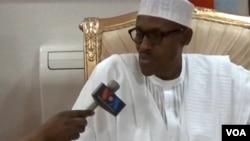Nigerian security forces must take the lead in battling the Boko Haram insurgency, President Muhammadu Buhari told VOA in an exclusive interview, as he appeared to push back against pressure from neighboring Chad and Niger for more autonomy in fighting the militants within Nigeria.
Buhari’s comments, made Friday, came as Boko Haram has intensified its attacks in the weeks since the March 31 presidential election. The unabated violence has undermined claims by Nigeria’s military that the tide has turned against the group.
On Monday, suicide bombers attacked Chad’s capital, killing at least 23 people and stoking fears that Boko Haram was widening its campaign.
Buhari, a former military ruler, climbed to victory in the presidential vote in large part due to voter disgust with the six-year insurgency that has killed more than 10,000 and driven more than 1 million Nigerians from their homes. Voters were also unhappy with the country’s economy and endemic corruption.
The Boko Haram violence has spread beyond the borders of Nigeria’s northeast, drawing in troops from Chad, Niger, Cameroon and Benin, with some of the foreign troops attacking the militants directly on Nigerian territory. Buhari’s predecessor, Goodluck Jonathan, also hired mercenaries from South Africa and Ukraine to help in the fight.
Boko Haram was prominent in Buhari’s inaugural speech, where he suggested Jonathan’s administration had botched the fight.
“Boko Haram is a mindless, godless group who are as far away from Islam as one can think of,” he said on May 29.
Since being sworn in, Buhari has traveled to Chad and Niger for discussions on the fight, and some of his critics have said it was improper for the new president to be traveling so much. Foreign military officials traveled to Abuja on Thursday for discussions on the Boko Haram fight.
The issue of foreign troops coming in to fight Boko Haram has been problematic for Nigeria, mainly for the perception it gives that Nigeria's military is unable to fight the militants.
In the VOA interview, Buhari said his visit to Niger and Chad was to thank them for their help in the fight, but also to make clear that Nigerian forces must take the lead.
“I reasoned with them because Nigeria is a battlefield. If they get the access, then they have to come and fight for us and secure Nigerian territory for Nigerians,” Buhari said. “This is why… I wanted to thank them and to listen to them on how we ought to proceed in dealing with terrorism in Nigeria and in the subregions in particular.”
Chad’s president has complained that poor coordination with Nigeria was hampering his soldiers’ ability to strike the militants.
Buhari took a swipe at Jonathan for the precarious state of Nigeria’s oil-dependent economy. Long Africa’s biggest producer, Nigeria’s oil industry has been chronically mismanaged and rife with corruption. The global fall in oil prices over the past year has also deprived the country of crucial revenues.
Buhari suggested that since his tenure as a top government oil official in 1990s, the country’s oil capacity had suffered.
“It’s most unfortunate that subsequent governments destroyed the petroleum infrastructure,” he said.
Last month, in the weeks leading up to Buhari’s inauguration, a major strike by fuel wholesalers caused widespread economic disruption, grounding domestic airlines, shuttering gas stations went dry and forcing banks to close. The wholesalers had stopped distributing gas, claiming the government owed them $1 billion.
The wholesalers called off the strike days before Buhari's swearing-in.
Buhari promised to do more to address the problem of youth unemployment; some estimates say up to 60 percent of the country’ 173 million people are unemployed young people. He said he would invest heavily agriculture and mineral industries to create jobs.
He also said he would involve more young Nigerians in his administration, and wouldn’t limit government appointees to "old men like me."





